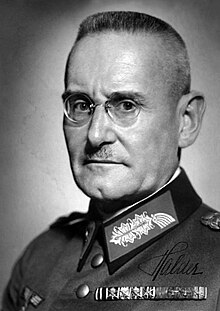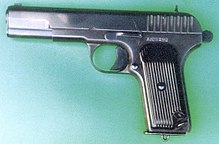Franz Halder

Franz Ritter Halder (June 30, 1884 – April 2, 1972) was a German general and the chief of staff of the Army High Command (OKH) in Nazi Germany from 1938 until September 1942. During World War II, he directed the planning and implementation of Operation Barbarossa, the 1941 invasion of the Soviet Union. Halder became instrumental in the radicalisation of warfare on the Eastern Front. He had his staff draft both the Commissar Order (issued on 6 June 1941) and the Barbarossa Decree (signed on 13 May 1941) that allowed German soldiers to execute Soviet citizens for any reason without fear of later prosecution, leading to numerous war crimes and atrocities during the campaign. After the war, he had a decisive role in the development of the myth of the clean Wehrmacht.
Halder participated in the strategic planning for the 1939 German invasion of Poland. The plans authorised the SS to carry out security tasks - on behalf of the army - that included the imprisonment or execution of Poles. In July 1940 he began planning for the Axis invasion of the Soviet Union (Operation Barbarossa), which began on 22 June 1941. That summer Halder engaged in a long-running and divisive dispute with Hitler over strategy. Hitler removed Halder from command in September 1942. After the 20 July 1944 plot to assassinate Hitler, Halder was arrested as it came to light that he had been involved in an earlier plot, leading to his imprisonment. As chief of OKH General Staff, he had kept extensive notes, later published as The Halder Diaries.
After World War II, Halder served as a lead consultant for the US Army Historical Division. He oversaw the writing of over 2,500 historical documents by 700 former Nazi officers, whom he instructed to remove material detrimental to the image of the German armed forces. Halder used his influence to foster a false history of the German-Soviet conflict in which the German army fought a "noble war" and which denied its war crimes. The US Army overlooked Halder's apologia because Halder's group was providing military insights on the Soviet Union that it deemed important in the light of the Cold War. Halder succeeded in his aim of exonerating the German Army: first with the US military, then amongst widening circles of politicians and eventually in American popular culture. In 1961, he was awarded the Meritorious Civilian Service Award, becoming the only German ever to be decorated both by Hitler and by an American president.
Quotes
[edit]- The Russian colossus...has been underestimated by us...whenever a dozen divisions are destroyed the Russians replace them with another dozen.
- August 1941, from "The World at War" - Page 129 - by Mark Arnold-Forster - World War, 1939-1945 - 1981

- Bad weather has grounded the Luftwaffe and now we must stand by and watch countless thousands of the enemy getting away to England under our noses.
- May 30, 1940 diary entry, quoted in "The Struggle for Europe" - Page 20 - by Chester Wilmot - History - 1972.
- The Führer confirms my impressions of yesterday. He would like an understanding with Great Britain. He knows that war with the British will be hard and bloody, and knows also that people everywhere today are averse to bloodshed.
- July 14, 1940 diary entry, quoted in "Their Finest Hour" - Page 230 - by Winston Churchill - History - 1986.
- It was a distance about twice as long as this room; then there was a wall, and just beyond it the crematory. When the wind blew in at the south I got smoke in my cell. It was a fat smoke, big flakes of smoke - human smoke.
- To Leon Goldensohn, April 5, 1946, from "The Nuremberg Interviews" by Leon Goldensohn, Robert Gellately - History - 2004

- In Flossenbürg, you noticed things more; you had to notice every day so many people hanged in the courtyard. People were brought to their execution completely naked. They were driven into the courtyard and I could hear the noise of naked feet on the court ground right outside my window. Stretchers with corpses were carried past the doors of our cells. If by chance the peek holes were open, one could see them going by. In the courtyard where you took a walk, they had gallows arranged in such a way that you were obliged to look at them.
- To Leon Goldensohn, April 5, 1946, from "The Nuremberg Interviews" by Leon Goldensohn, Robert Gellately - History - 2004.
- There were daily quarrels all summer. The point upon which we had our final disagreement was the decision of an offensive on the Caucasus and Stalingrad - a mistake, and Hitler didn't want to see it. I told him the Russians would put in another million men in 1942 and get another million in 1943. Hitler told me that I was an idiot - that the Russians were practically dead already. When I told Hitler about Russian armament potentials, especially for tank materials, Hitler flew into a rage of fury and threatened me with his fists.
- To Leon Goldensohn, April 12, 1946, from "The Nuremberg Interviews" by Leon Goldensohn, Robert Gellately - History - 2004.
- Whenever I go and see the Führer, I've got a loaded pistol in my pocket.
- Explaining his fear of Hitler, from "The Guardian," July 11, 2004.


